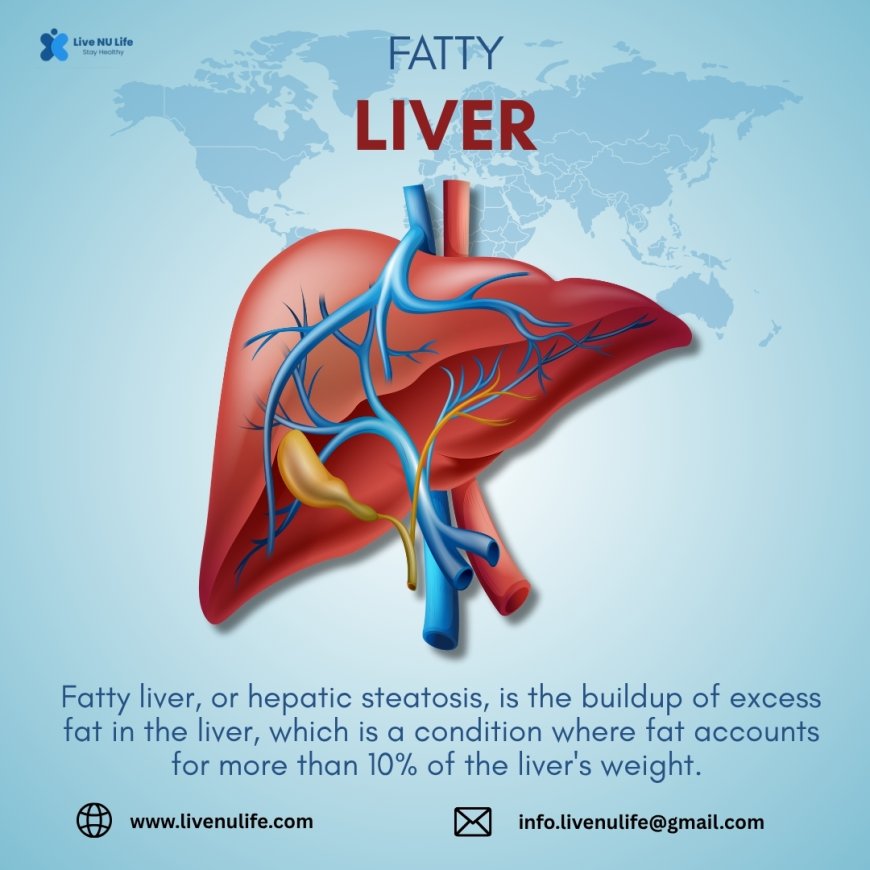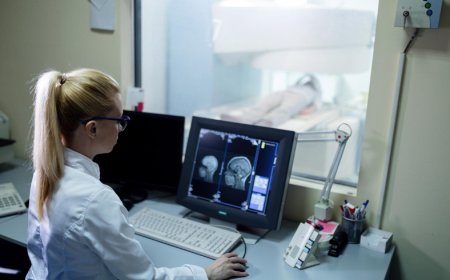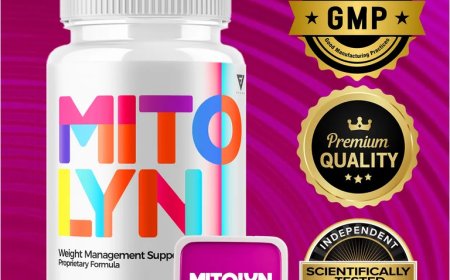Fatty Liver
Your liver plays one of the most important roles in keeping your body healthy. It helps digest food, stores nutrients, and removes toxins. But when excess fat starts building up in your liver cells, it can lead to a condition called Fatty Liver — also known as hepatic steatosis.

Understanding Fatty Liver: Causes, Symptoms, and Prevention
Your liver plays one of the most important roles in keeping your body healthy. It helps digest food, stores nutrients, and removes toxins. But when excess fat starts building up in your liver cells, it can lead to a condition called Fatty Liver — also known as hepatic steatosis.
A small amount of fat in the liver is normal, but when it exceeds 5% to 10% of the liver’s weight, it becomes a problem. Fatty Liver is becoming more common today due to poor diet, lack of exercise, and lifestyle habits. The good news is that it can often be reversed with healthy changes if detected early.
What Causes Fatty Liver?
There are two main types of fatty liver: Non-Alcoholic Fatty Liver Disease (NAFLD) and Alcoholic Fatty Liver Disease (AFLD).
-
Non-Alcoholic Fatty Liver Disease (NAFLD): This type occurs in people who drink little or no alcohol. It’s mainly linked to obesity, high cholesterol, insulin resistance, or type 2 diabetes.
-
Alcoholic Fatty Liver Disease (AFLD): This type results from excessive alcohol intake, which damages liver cells and causes fat buildup.
Other causes can include rapid weight loss, certain medications, and poor nutrition.
Common Symptoms of Fatty Liver
In its early stages, fatty liver often doesn’t cause noticeable symptoms. Many people only discover it during routine health checkups or ultrasounds. However, as it progresses, you might experience:
-
Constant tiredness or weakness
-
Pain or discomfort in the upper right side of your abdomen
-
Unexplained weight loss
-
Poor appetite or nausea
-
Yellowing of the skin or eyes (in severe cases)
These symptoms can be mild at first but shouldn’t be ignored, as untreated fatty liver can lead to inflammation and scarring (cirrhosis) over time.
How Is Fatty Liver Diagnosed?
Doctors typically diagnose fatty liver through a combination of blood tests, imaging scans, and sometimes a liver biopsy.
-
Blood tests help detect elevated liver enzymes.
-
Ultrasound or CT scans show the extent of fat buildup.
-
Liver biopsy may be done to check for inflammation or damage.
Early detection is key to reversing the condition before it causes lasting harm.
Treatment and Lifestyle Changes
There’s currently no specific medicine for fatty liver, but the most effective fatty liver treatment involves lifestyle changes. Here’s what you can do:
-
Maintain a healthy weight: Gradual weight loss can reduce fat in your liver.
-
Eat a balanced diet: Focus on vegetables, fruits, whole grains, and lean proteins. Avoid processed foods, sugary drinks, and fried items.
-
Exercise regularly: Aim for at least 30 minutes of physical activity five days a week.
-
Avoid alcohol: If you have alcoholic fatty liver, quitting alcohol is essential.
-
Manage health conditions: Control diabetes, cholesterol, and blood pressure with your doctor’s guidance.
Small, consistent steps can make a big difference in reversing fatty liver and improving your overall health.
Can Fatty Liver Be Prevented?
Absolutely! Prevention starts with simple, mindful habits. Eat healthy foods, stay active, avoid excessive alcohol, and go for regular checkups. Making these lifestyle choices not only prevents fatty liver but also protects your heart and boosts your energy levels.
Final Thoughts
Fatty liver disease is a silent but manageable condition. The earlier you detect it, the easier it is to treat and even reverse. By maintaining a balanced diet, staying active, and keeping your liver healthy, you give your body the best chance to function at its full potential.
Taking care of your liver isn’t just about avoiding illness — it’s about living a healthier, more energetic life every day.
FAQs About Fatty Liver
1. What is Fatty Liver?
Fatty liver is a condition where too much fat builds up in your liver cells. While a small amount of fat is normal, excessive fat can cause inflammation and liver damage if not managed properly.
2. What are the early symptoms of Fatty Liver?
In the early stages, fatty liver usually doesn’t show clear symptoms. However, you may feel tired, weak, or notice mild pain on the upper right side of your abdomen. In advanced stages, symptoms like nausea, jaundice, and weight loss may appear.
3. Is Fatty Liver a serious condition?
Fatty liver isn’t immediately dangerous, but if left untreated, it can lead to serious conditions like liver inflammation, fibrosis, or cirrhosis. Early detection and healthy lifestyle changes can prevent these complications.
4. What foods should I avoid if I have Fatty Liver?
Avoid foods high in sugar, refined carbs, and unhealthy fats. Stay away from fried items, sugary drinks, alcohol, processed snacks, and fast food. Instead, focus on fruits, vegetables, whole grains, and lean proteins.
5. Can Fatty Liver be cured naturally?
Yes, in many cases, fatty liver can be reversed naturally through lifestyle changes. Maintaining a healthy weight, eating a balanced diet, exercising regularly, and avoiding alcohol are key steps to cure fatty liver naturally.
6. How is Fatty Liver diagnosed?
Doctors diagnose fatty liver using blood tests to check liver enzymes, imaging scans like ultrasound or CT, and sometimes a liver biopsy. These tests help determine how much fat has accumulated in the liver.
7. How long does it take to recover from Fatty Liver?
Recovery time depends on how advanced the condition is and how well you follow your treatment plan. With consistent lifestyle changes, improvement can be seen within a few months, but full recovery may take longer.
8. Can Fatty Liver return after treatment?
Yes, if you return to unhealthy habits, fatty liver can come back. Maintaining a balanced diet, regular exercise, and avoiding alcohol are essential to prevent recurrence.
9. Is exercise good for Fatty Liver?
Absolutely! Regular exercise helps burn excess fat and improve liver function. Even simple activities like walking, cycling, or yoga can make a big difference in managing fatty liver.
10. Can Fatty Liver cause other health problems?
Yes. Fatty liver is often linked with other conditions like obesity, diabetes, and high cholesterol. Managing your liver health can also protect your heart and overall well-being.





























